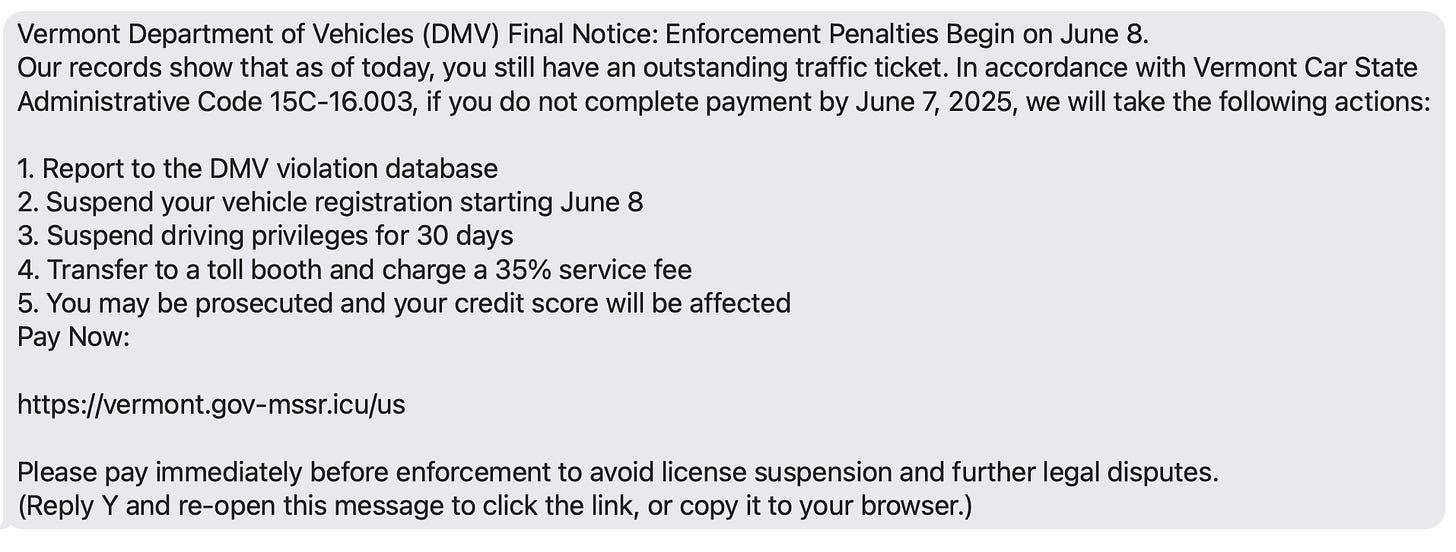Vermont Drivers Warned of Rising Scam Messages Threatening License Suspension
Compass Vermont was one of the recipients of this text scam.
June 8, 2025 – Vermont residents are being urged to stay vigilant as a wave of fraudulent messages targeting drivers sweeps across the state and beyond. The Vermont Department of Motor Vehicles (DMV) has issued a warning about deceptive texts, emails, and phone calls falsely claiming that drivers owe unpaid tolls or face immediate license suspension for alleged violations. These sophisticated scams, also reported in states like Connecticut, Pennsylvania, Georgia, and California, are designed to trick recipients into sharing personal information or making payments to fraudulent sources.
How the Scam Works
The scam messages often appear official, mimicking government communications with urgent language, fake administrative codes, and links that resemble legitimate DMV websites. Recipients are warned of consequences like credit score damage, revoked driving privileges, or increased fees if they don’t act quickly. For example, a typical message might read: “Vermont DMV: Your license is at risk of suspension due to unpaid tolls. Pay now at [fraudulent link] to avoid penalties by [date].”
Scammers rely on fear and urgency to prompt hasty action, but the Vermont DMV emphasizes that it does not send unsolicited messages demanding immediate payment or threatening suspension. Vermont also has no toll roads, making any toll-related message an immediate red flag.
A Nationwide Issue
This scam isn’t unique to Vermont. As of June 2025, at least 14 states, including New York, Texas, and North Carolina, along with Washington, D.C., have reported similar fraudulent messages. The FBI has also noted a rise in such schemes, which exploit the trust people place in official-sounding communications. The scammers’ tactics are evolving, with messages growing more convincing by incorporating familiar terms and realistic-looking web addresses.
How to Protect Yourself
The Vermont DMV and cybersecurity experts offer clear steps to avoid falling victim to these scams:
Pause and Verify: Be skeptical of any message creating panic or demanding immediate action. Official DMV notices are typically sent via mail or verified channels, not unsolicited texts or emails.
Avoid Clicking Links: Never click links in unexpected messages. If instructed to copy a link into your browser, it’s a scam. Use antivirus software to protect against malicious links that could install malware.
Contact the DMV Directly: If you’re unsure about a message, reach out to the Vermont DMV’s Information Unit at DMV.InformationUnit@vermont.gov or through the official website. Never use contact details provided in the suspicious message.
Delete and Report: Delete the message immediately and block the sender. Forward the text to 7726 (SPAM) to alert your mobile provider, and report the scam to the Federal Trade Commission at ReportFraud.ftc.gov or the FBI’s Internet Crime Complaint Center at ic3.gov.
Safeguard Your Data: Avoid sharing personal or financial information, such as your driver’s license number or banking details. Consider a personal data removal service to reduce your online exposure to scammers.
What to Do if You’ve Been Targeted
If you’ve clicked a link or shared information, act quickly. Contact your bank or credit card provider to secure your accounts and notify local law enforcement. Regularly update your phone’s security features and register with the National Do Not Call Registry to reduce unwanted communications.
Staying One Step Ahead
The Vermont DMV encourages residents to spread awareness about these scams to protect friends and family. By recognizing the signs—urgent demands, suspicious links, and unofficial contact methods—drivers can stay safe. “These scammers are clever, but with a little caution, you can outsmart them,” says a DMV spokesperson. “When in doubt, verify directly with us.”
For more information or to confirm the legitimacy of a notice, visit the Vermont DMV’s official website or contact their Information Unit. Let’s keep Vermont’s roads—and personal information—secure.


